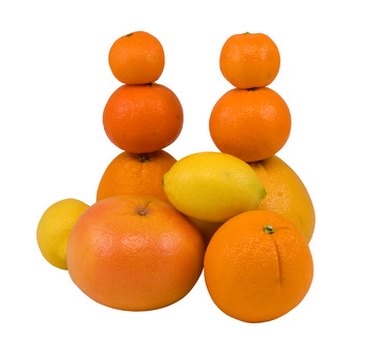
Despite their protective peels, oranges and tangerines are surprisingly fragile. If you leave them out on the counter at room temperature, they will begin to decline in quality after only a few days to a week. This might not be a problem if you bought an orange or two at the store, but for larger quantities chances are you will want to keep them fresh longer. With proper care, you can keep tangerines and oranges fresh for up to two weeks.
Step 1
Select the freshest oranges and tangerines possible, as these will stay fresh longer than overripe specimens. The fruits should not be discolored, soft, squishy or moldy. The skin should be smooth, and each fruit should feel heavy for its size. Do not attempt to store oranges or tangerines that show any signs of damage, have wrinkled skins or feel relatively light.
Video of the Day
Step 2
Put the oranges and tangerines into a plastic bag. Wrap the bag closed loosely. It does not need to be airtight.
Step 3
Place the bag of oranges and tangerines into your refrigerator's crisper drawer. Ideally, you should keep them between 35-50 F. If the crisper drawer has an option to control humidity, set it to keep the oranges fairly dry; excess humidity is bad for oranges and can cause them to mold and go bad more quickly.
Step 4
Consume or use the oranges and tangerines within approximately two weeks of purchasing or picking them. They may last longer, but their quality and flavor will begin to noticeably decline after about two weeks.
Tip
You can freeze juice and zest from oranges and tangerines if you do not have room to save them all whole or wish to enjoy their flavor for longer than two weeks. You can also cut the citrus fruits into pieces and pour sugar syrup over them, then freeze the pieces. Do not try to freeze the fruits whole, however, and do not freeze navel oranges or their juice, as these become bitter.
The color of the skin is not an important factor when selecting fresh, healthy oranges; even perfectly ripe oranges can have a hint of green.
With some fruits, you should buy slightly under-ripe specimens if you wish to store them, then allow them to ripen in storage. This is not the case with oranges, which do not ripen further after they have been picked. For this reason, you should select perfectly ripe oranges at the store, even if you do not intend to use them for a week or more.
Video of the Day